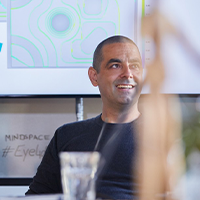Dirk Hartmann | Siemens Technical Fellow

Siemens Digital Industries Software
Munich, Germany
Department: Simulation and Test Solutions, Strategy and Innovation
Education: Master of Advanced Study, Applied Mathematics, and Theoretical Physics, University of Cambridge, Physics Diploma, Mathematics Diploma, and Mathematics Doctor of Natural Sciences, University of Heidelberg
Career stage: Mid
What do you do?
As a Siemens Technical Fellow for one of the biggest simulation companies, my main responsibility is to scout novel technologies and to feed them into our innovation funnel. The latter includes the realization of proof of concepts as well as demonstrators, thus rapid prototyping is part of the job. Furthermore, to identify high value opportunities for novel products and solutions, networking with the whole Siemens organization, our customers, as well as academic partners is part of my daily activity.
What types of skills do you use?
Beyond a broad mathematical skillset and a good portion of curiosity, networking is key to identifying the right opportunities. The segment at Siemens I am part of develops simulation and test solutions. The heart of these is advanced mathematical algorithms. Therefore, applied mathematics and computational science are at the core of every product and every project with which I am involved. They are the fuel for our innovation pipeline.
What are the pros and/or cons of your profession/job?
Pro: The job is really about what I love to do: exploring novel algorithms, networking with people, and at the same time creating value for our customers and society. Sometimes it is hard to distinguish whether this is a job or a hobby.
Con: There are no big cons, but as in all big organizations, sometimes there are administrative overheads, some not-too-productive meetings, and times when the organization is not moving as fast as I would love it to move.
Does your job offer flexibility?
My job offers great flexibility; Siemens is a great role model here. For example, my direct colleagues and I are distributed all over Europe and even Canada, but we still have strong roots in the local offices. For me, it is a great mix of working from home, working in the office, and traveling.
What career path did you take to your current position?
I started my studies with degrees in physics and slowly moved to applied mathematics, driven by my passion for numerical methods. Having a strong desire to create impact, I focused early on applying mathematics and numerical methods to real-world problems. In my Ph.D. and as a postdoc, I focused on mechano-biology before I was offered an opportunity at Siemens Technology. At Siemens I took several roles, from individual contributor to consultant and project/program manager as well as the lead researcher for the technology field Simulation and Digital Twin. Driven by my ambition to create even more impact on Siemens offerings, I moved to the Siemens Business Unit Digital Industry Software, where I am currently a Siemens Technical Fellow.
Was your career path well planned or a result of taking opportunities as they arose?
While the career path might look straightforward, it was really a result of taking on opportunities and challenges whenever I spotted them.
What advice would you give to someone pursuing a similar degree or profession?
Focus on what you love to do and what you are good at. In addition, try to network as much as possible and do a couple of internships to learn where you would like to work and to identify future job opportunities – this is something I have not done personally but would do differently.
Salary
Salaries depend strongly on experience and location. Search terms: (Senior) Director, Technical Fellow.
Back to List